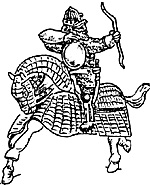 Wargamers opt for the fantasy period for many reasons. Here are some of mine.
Wargamers opt for the fantasy period for many reasons. Here are some of mine.
The period is very colourful. The armies don't dress in khaki drab or even natural, unbleached linen and wool like most ancient armies. No self-respecting orc would be seen dead in an outfit that wasn't garish, no humdrum or even nicely harmonising colours for him. Then, of course, even the skins of some troops are a vast change to other wargaming periods. The terrain is also usually colourful because it is an exaggerated version of real terrain, with swamps and marshes in addition to your usual hills and woods, now grown out of proportion into mountains and forests.
Even as the terrain features grow in size and acquire atmospheric names, nondescript generals in other periods become heroic characters on the fantasy milieu. They are now capable of great deeds of derring-do and possess abilities that set them apart from the normal members of their force. These larger than life characters inspire interest in their personalities and deeds that don't exist even with charismatic generals like Napoleon or Rommel.
This fascination with the individual amongst the fantasy armies inspires a greater interest in and ability with the narrative aspects of the game. With more incentive the fantasy gamer is more likely to use Don Featherstone's ideas of a narrative introduction to his wargame. This will often be developed further into a complete fantasy campaign. No known fantasy wargamer has, when creating his campaign, stopped at the usual historical level of one war, or even part of a war. No, the fantasy campaigner always goes for a complete world, with the different races and monsters taking their place in the scheme of things.
This tendency to overdo things, which appears to be shared by fantasy writers, is aided in wargaming terms by the small size of the armies deployed. No one in a fantasy world expects the armies deployed to be the same size as the "Armee du Nord" or the "Africa Corps". No, fantasy armies are still small enough for the deeds of individual heroes to stand out and be seen for later bards and skalds to sing about. This small scale fighting is an advantage to all wargamers, but especially to soloists who must provide both sides before they can play a game.
Magic. The very use of the word sets the fantasy wargamer apart from his fellow gamers. Magic can be merely the artillery of a fantasy game, or it can be the great leveller between two otherwise unequal forces. The unpredictable nature of magic puts an extra element of excitement into the battle, when no-one knows what magic is about or whether it will work or not. This extra randomness in the game is a boon to the solo wargame which can never get stuck in the mud, except literally, when magic is about. Any game with magic in it will never be boring.
Fantasy wargaming has no historical precedents. There is no "book" around that the fantasy general has to go by. Any tactics may work well, or badly, and there is no way that any tactics can be described as unrealistic of the period. For example, Blitzkrieg is a WWII tactic, or is it? A fantasy orc army moving quickly behind their armoured spearhead of trolls, exploiting gaps in the enemy line with the aid of their own flying artillery, in the form of orcs or goblins mounted on giant bats, pteradons, or even dragons.... does this sound familiar?
The fantasy period is not fixedly rooted in historical detail, although some historical armies, Normans, Vikings, Irish etc can be used within it. This leads to the absence of the carping sort of criticism of figures and painting by those experts whose only joy seems to be in denigrating other players painting skills or research. This aspect also gives rise to much more interesting research material, what there is of it. Compared to the sometimes dry and dusty historical sources; folklore, fairy stories and fantasy novels are far more stimulating research material.
This lack of historical background also makes for a game untroubled by with moral problems. Everyone knows who the good guys and bad guys are, but because this is fantasy there are no problems in playing with orcs, goblins, trolls or undead. In fact my current favourite fantasy army is my orcs, because they die for me so willingly. There are therefore no uncomfortable wargames in a fantasy setting.
All of the above points show why fantasy wargaming is gaining ground. It is when all is said and done pure escapist fun. If you haven't already done so give it a try.
Back to Table of Contents -- Lone Warrior #108
Back to Lone Warrior List of Issues
Back to MagWeb Master Magazine List
© Copyright 1994 by Solo Wargamers Association.
This article appears in MagWeb (Magazine Web) on the Internet World Wide Web.
Other military history articles and gaming articles are available at http://www.magweb.com
